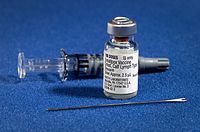
Photo from wikipedia
Objective To describe infants with acute gastroenteritis symptoms in primary and secondary care who have the Rotarix vaccine-derived G1P[8] rotavirus strain identified in their stools. Design This is a prospective… Click to show full abstract
Objective To describe infants with acute gastroenteritis symptoms in primary and secondary care who have the Rotarix vaccine-derived G1P[8] rotavirus strain identified in their stools. Design This is a prospective national surveillance conducted by Public Health England (PHE). Rotavirus-positive samples from vaccine-eligible children are routinely submitted to PHE for confirmation, and general practitioners are requested to complete a surveillance questionnaire for all cases. The modified Vesikari Score was used to assess severity of gastroenteritis. Setting England, July 2013–September 2016. Results 2637 rotavirus strains were genotyped and 215 (8%) identified as the Rotarix vaccine-derived G1P[8] strain. There were no Rotarix vaccine-derived G1P[8] strains detected in unimmunised infants. Rotarix vaccine-derived G1P[8] strains clustered around the time of rotavirus vaccination and were responsible for 82% (107 of 130) of rotavirus-positive samples in 2-month-old infants and 68% (36 of 53) in 3-month-old infants. However, 13 samples were obtained more than 7 weeks after the last vaccination date; 10 of these specimens were from six children who were subsequently diagnosed with severe combined immunodeficiency (SCID). Diarrhoea was the single most common presenting symptom (83.0%) in infants with Rotarix vaccine-derived G1P[8] strains, who were less likely to present with fever, vomiting, dehydration or severe gastroenteritis than infants with wild-type rotavirus infection. Conclusions Rotavirus identified in stools of infants around the time of their routine immunisations is most likely the Rotarix vaccine-derived G1P[8] strain. Infants with undiagnosed SCID at the time of rotavirus immunisation may experience prolonged gastroenteritis symptoms. Most infants with vaccine strains in their stools more than 7 weeks after immunisation had SCID.
Journal Title: Archives of Disease in Childhood
Year Published: 2019
Link to full text (if available)
Share on Social Media: Sign Up to like & get
recommendations!